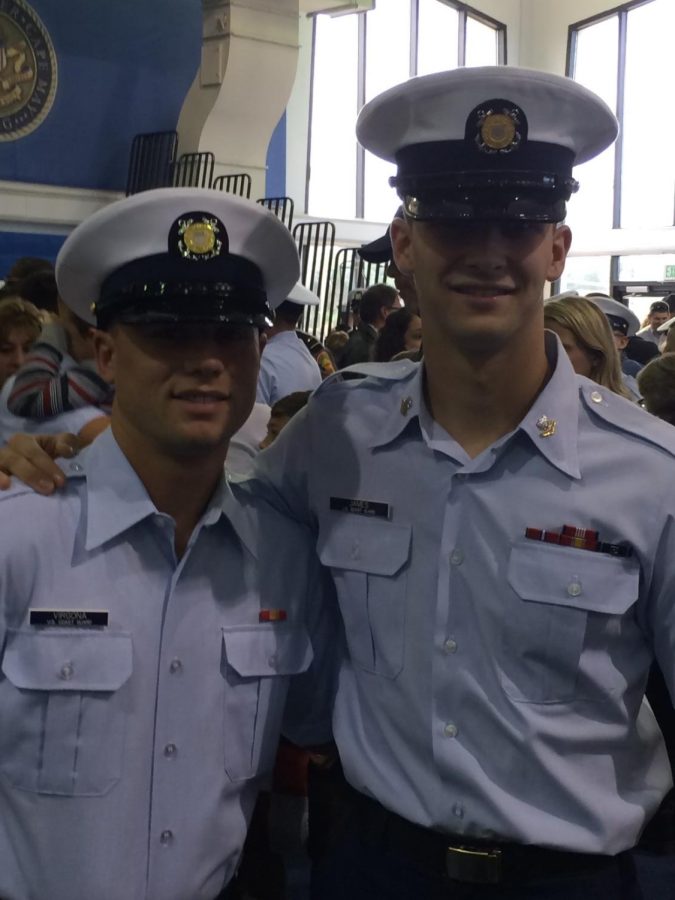The Coast Guard, Often Overlooked, Plays a Major Role on Long Island
The six Unites States military branches are the Army, Navy, Marines, Air Force, Space Force, and Coast Guard. Each of these branches serves Long Island, but one of the most important on the island is the United States Coast Guard (USCG). Long Island, a densely populated island off of mainland New York, featuring coastal communities in every direction, is surrounded by the Atlantic Ocean and the Long Island Sound. The Coast Guard, an often overlooked branch of the miliary, plays a major role in protecting the waters off of Long Island. “On Long Island, the Coast Guard performs three jobs: maritime law enforcement, environmental protection, and search and rescue,” said Nick Paladino, LHS Class of 2020 and a student at SUNY Maritime University. Paladino is studying mechanical engineering while also in the United States Coast Guard licensing program. With stations located in Montauk, Shinnecock, Fire Island, Jones Beach, Eatons Neck, and New York City, the Coast Guard is ready to operate at any given moment. In addition, there is a Coast Guard Station in New Haven, Connecticut, which operates in the Long Island sector as well.
“The major roles of the USCG on Long Island are the safety of boaters and mitigating environmental risks,” said TJ Virgona, LHS Class of 2010 and a marine science technician with the United States Coast Guard. “My main job is to enforce the ‘Code of Federal Regulations’ for the ports of New York City and ships that are coming into New York City ports. We board boats to ensure that all passengers are being treated fairly and according to the laws of ‘Safety of Lives at Sea’ regulations,” Virgona added. “Long Island and New York City have become the busiest ports in the country in regard to goods being imported in. We have a large responsibility to ensure that these goods are checked for illegal substances, and [we need to] create the most efficient systems and structures to make the least economic impact,” said Virgona.
The Code of Federal Regulations is heavily based on environmental laws to protect Long Island’s ecosystems and waters. “With vessels, especially larger ships sharing the same waters as the beaches on Long Island, environmental protection is an incredibly important part of the Coast Guard’s duties. To ensure the water isn’t polluted by these ships, the Coast Guard can check and [analyze] records onboard the vessels,” said Paladino. In addition to preventing oil and chemical spills, the Coast Guard also enforces regulations to stop unauthorized ocean dumping and prevent the introduction of invasive species.
To sail any type of vessel, there is a strict code of rules one must follow. “The Coast Guard ensures the rules are followed and can fine, arrest, and take the licenses of anyone disobeying the rules,” said Paladino. Some of these rules include carrying life jackets onboard, not being under the influence of drugs or alcohol while operating the craft, and displaying the vessel’s registration. “When a vessel gets into trouble, the Coast Guard is responsible for locating and rescuing those onboard,” Paladino added.
“The most common job we do [at Coast Guard Station Fire Island] is search and rescue and law enforcement,” said Petty Office Orozco of the Fire Island Station. “[For] search and rescue, we would go out on two small boats, and then we would respond to whatever the case may be, such as vessels taking on water or people who are injured. Our procedures would be to get ready, make a plan, do an assessment amongst the crew, get on the boat, and safely get there to help whoever needs help,” said Orozco. In October 2020, the Coast Guard airlifted three survivors off a distressed vessel offshore of Fire Island. The Coast Guard Fire Island boat crew evaluated the scene and called for the MH-65 Dolphin helicopter crew from the Coast Guard Air Station in Atlantic City for assistance. The fast response from the Unites States Coast Guard saved the lives of the personnel on board.
If ever in need of the Coast Guard in an emergency, one can dial 911, or if on board a vessel, one can send out a signal on Channel 16 or 27.88mHz, which is reserved for distress calls monitored by the Coast Guard.

Hello! My name is Amelia Doyle. I am a member of the class of 2024. I play on the varsity volleyball team and the girls' varsity flag football team. I...























